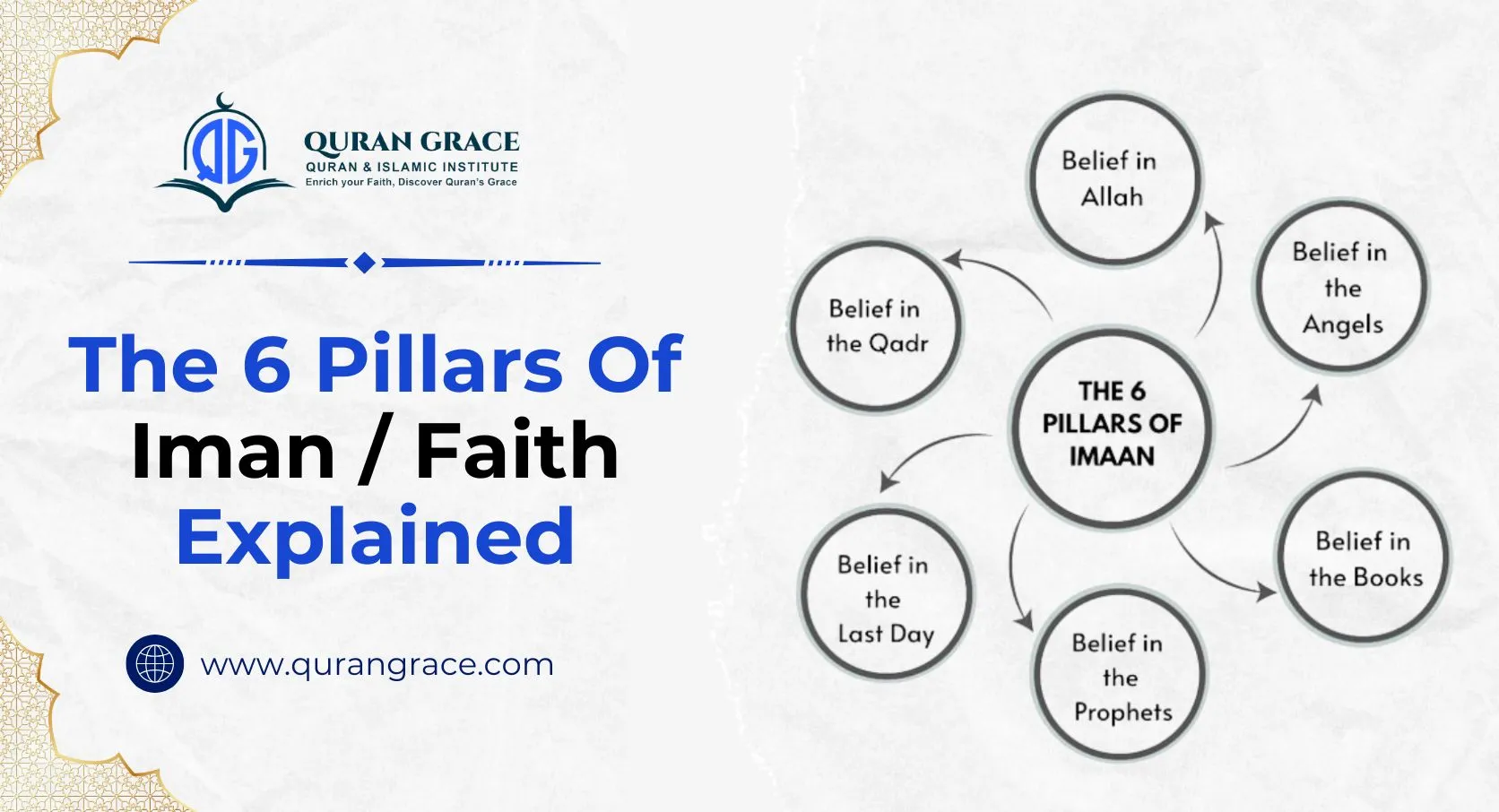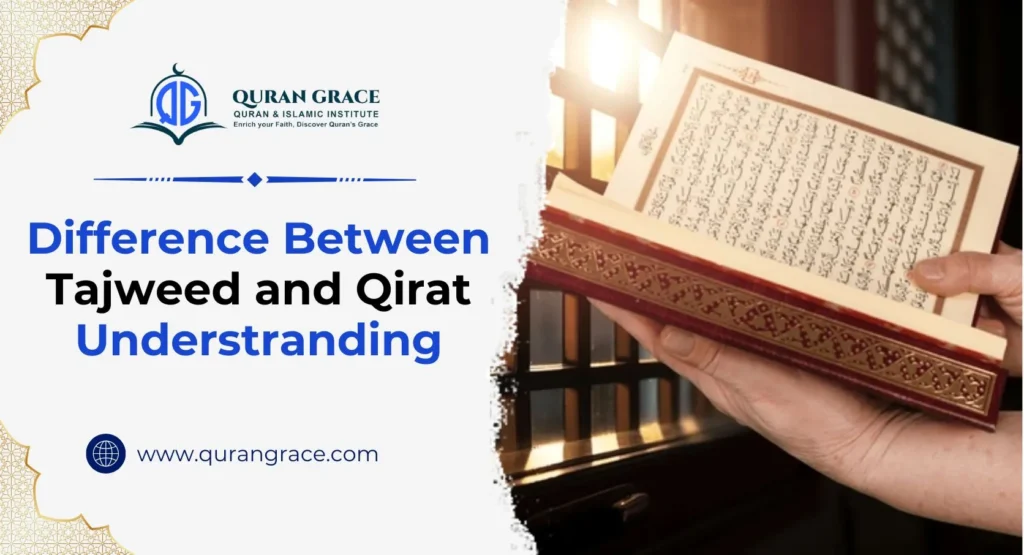Iman, often translated as “faith” or “belief,” is the bedrock of Islam. It’s not just a superficial acknowledgment but a deep-rooted conviction that influences every aspect of a Muslim’s life. The Quran and Sunnah (the teachings and practices of Prophet Muhammad, peace be upon him) outline six essential pillars of Iman that every Muslim is required to believe in. These pillars provide a comprehensive framework for understanding Allah, His creation, and humanity’s purpose.
The 6 Pillars Of Iman / Faith Explained
Let’s explore each of these pillars in detail:
-
Belief in Allah (God)
This is the cornerstone of Iman and the essence of Islam. Belief in Allah encompasses several key aspects:
- Tawhid (Oneness of God): This is the most fundamental concept, affirming that Allah is one, unique, and has no partners or equals. He is the sole Creator, Sustainer, and Lord of the universe. This belief rejects any form of polytheism or idolatry.
- His Attributes: Believing in Allah’s perfect attributes as described in the Quran and Sunnah, such as His all-encompassing knowledge, power, wisdom, mercy, justice, and love. We believe He is free from any imperfections.
- His Lordship (Rububiyah): Acknowledging that Allah is the sole Creator, Provider, and Controller of everything in existence. Nothing happens without His will and knowledge.
- His Divinity (Uluhiyah): Recognizing that only Allah is worthy of worship. All acts of worship, whether prayers, supplications, or sacrifices, must be directed solely to Him.
- His Names (Asma al-Husna): Believing in and reflecting upon His beautiful names, each representing a divine attribute, like Ar-Rahman (The Most Merciful) and Al-Alim (The All-Knowing).
This belief instills a sense of gratitude, humility, and complete reliance on Allah, guiding a Muslim’s moral compass and life choices.
-
Belief in His Angels
Angels are an unseen creation of Allah, made from light, and are constantly engaged in His worship and carrying out His commands. Belief in angels entails:
- Their Existence: Affirming that angels are real beings, not mere metaphors or symbolic representations.
- Their Nature: Understanding that they are pure, sinless, and possess immense strength and speed. They do not eat, drink, or sleep, and they have no free will, obeying Allah’s commands without question.
- Their Roles: Recognizing the various tasks assigned to them by Allah. Some examples include:
- Jibreel (Gabriel): Responsible for delivering divine revelations to prophets.
- Mika’il (Michael): Responsible for rain and vegetation.
- Israfil: The angel who will blow the trumpet to signal the Day of Judgment.
- Malak al-Mawt (Angel of Death): Responsible for taking souls.
- Kiraman Katibin: The noble scribes who record every person’s deeds.
- Guardians: Angels who protect individuals by Allah’s command.
Belief in angels reminds us of Allah’s meticulous planning and continuous involvement in the universe, as well as the constant presence of witnesses to our deeds.
-
Belief in His Books (Revealed Scriptures)
Allah, in His infinite mercy, has sent divine guidance to humanity through various prophets in the form of revealed books. This pillar entails:
- Divine Origin: Believing that these books originated from Allah and contain His true words and commands.
- Previous Scriptures: Acknowledging the divine origin of earlier scriptures such as:
- The Suhuf (Scrolls) of Ibrahim (Abraham)
- The Zabur (Psalms) of Dawud (David)
- The Tawrat (Torah) of Musa (Moses)
- The Injil (Gospel) of Isa (Jesus)
- The Quran as the Final Revelation: Firmly believing that the Quran is the final and most perfect revelation, sent to Prophet Muhammad (PBUH). It is preserved in its original form, uncorrupted, and abrogates any previous laws that were specific to earlier nations.
- Guidance for Humanity: Recognizing that these books serve as a source of guidance, wisdom, and laws for humanity, leading them to righteousness and success in this life and the hereafter.
Belief in divine books emphasizes the consistency of Allah’s message throughout history, culminating in the comprehensive and universal message of the Quran.
-
Belief in His Messengers (Prophets)
Allah has chosen certain individuals to convey His message to humanity. Belief in His messengers entails:
- Divine Selection: Affirming that prophets were chosen by Allah and were the best of their communities, entrusted with divine revelation.
- Their Mission: Recognizing that their primary mission was to call people to the worship of Allah alone, to convey His message, and to set an example of righteous living.
- Previous Prophets: Believing in all the prophets mentioned in the Quran, such as Adam, Nuh (Noah), Ibrahim (Abraham), Musa (Moses), Isa (Jesus), and many others. We make no distinction between them.
- Prophet Muhammad as the Seal of Prophets: Firmly believing that Prophet Muhammad (PBUH) is the last and final prophet, and no prophet will come after him. His message is for all of humanity until the Day of Judgment.
- Their Infallibility in Conveying the Message: Believing that prophets were protected by Allah from making errors in conveying His message.
Belief in prophets ensures that Muslims follow the path guided by Allah, learning from the lives and teachings of these exemplary individuals.
-
Belief in the Day of Judgment (Akhirah)
This pillar is crucial as it shapes a Muslim’s perspective on life and morality. It encompasses belief in:
- The End of the World: The inevitable end of this worldly life and the destruction of the universe.
- Resurrection: That all human beings will be resurrected from their graves in their original physical forms.
- The Reckoning: Every individual will be brought before Allah to account for their deeds, both good and bad, performed during their life.
- The Scale of Deeds: Deeds will be weighed on a divine scale, determining one’s ultimate destination.
- Heaven (Jannah) and Hell (Jahannam): Believing in the existence of Paradise as a reward for the righteous and Hellfire as a punishment for the disobedient. These are eternal abodes.
- The Sirat Bridge: A bridge over Hellfire that all souls must cross, with the righteous crossing swiftly and the wicked falling.
- Intercession: The belief that prophets, righteous people, and angels may intercede for others with Allah’s permission.
Belief in the Day of Judgment motivates Muslims to live a life of righteousness, accountability, and preparation for the hereafter, understanding that this life is a temporary test.
-
Belief in Divine Decree (Qadar)
Qadar refers to Allah’s divine decree, encompassing His perfect knowledge and power over all things. This pillar entails:
- Allah’s Foreknowledge: Believing that Allah has full knowledge of everything that has happened, is happening, and will happen. Nothing is hidden from Him.
- His Recording: That Allah has recorded everything in a preserved tablet called Al-Lawh Al-Mahfuz (The Preserved Tablet).
- His Will: That nothing occurs in the heavens or on earth except by His will. However, this does not negate human free will and accountability for their choices. Humans have been given the ability to choose between good and evil.
- His Creation: That Allah is the Creator of everything, including actions and their consequences.
Belief in Qadar helps Muslims find peace and contentment in both good times and adversity, knowing that everything is ultimately by Allah’s wisdom and plan. It encourages reliance on Allah while actively striving to do good.
Conclusion
To understand and learn these 6 pillars of Iman, you are welcome to join an exclusive course by Quran Grace based on the Pillars of Iman. We are determined to facilitate our learners with a free evaluation class at the beginning, and the Islamic studies course will be carried out with miscellaneous activities that will cover all the details.








